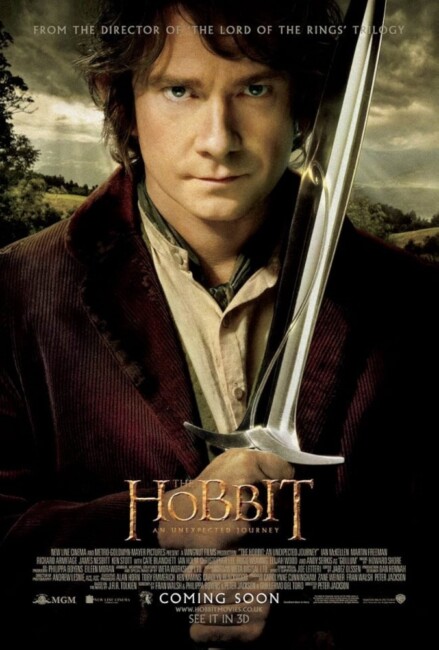USA/New Zealand. 2012.
Crew
Director – Peter Jackson, Screenplay – Philippa Boyens, Guillermo Del Toro, Peter Jackson & Fran Walsh, Based on the Novel The Hobbit by J.R.R. Tolkien, Producers – Carolyne Cunningham, Peter Jackson, Fran Walsh & Zane Weiner, Photography (3D) – Andrew Lesnie, Music – Howard Shore, Senior Visual Effects Supervisor – Joe Letteri, Visual Effects Supervisor – Eric Saindon, Animation Supervisor – Eric Reynolds, Visual Effects – Weta Digital, Ltd., Special Effects Supervisor – Steve Ingram, Makeup Effects Supervisor – Richard Taylor, Makeup/Creature Effects – Weta Workshop, Ltd. Production Design – Dan Hennah. Production Company – Wingnut Films/New Line Cinema/MGM.
Cast
Martin Freeman (Bilbo Baggins), Ian McKellen (Gandalf), Richard Armitage (Thorin Oakenshield), Andy Serkis (Gollum), Ken Stott (Balin), James Nesbitt (Bofur), Dean O’Gorman (Fili), Aidan Turner (Kili), Graham McTavish (Dwalin), William Kircher (Bifur/Tom Troll), Stephen Hunter (Bombur), John Callen (Oin), Peter Hambleton (Gloin/William Troll), Jed Brophy (Nori), Mark Hadlow (Dori/Bert Troll), Adam Brown (Ori), Sylvester McCoy (Radagast), Cate Blanchett (Galadriel), Hugo Weaving (Elrond), Christopher Lee (Saruman), Barry Humphries (Great Goblin), Ian Holm (Old Bilbo), Elijah Woods (Frodo Baggins), Manu Bennett (Azog), Jeffrey Thomas (Thror), Bret McKenzie (Lindir)
Plot
Bilbo Baggins writes down for his nephew Frodo the story of an adventure he went on sixty years ago. As a young man, he was visited by the wizard Gandalf who invited thirteen dwarves to Bilbo’s hobbit hole. Finding his home overtaken, Bilbo learned of an adventure they were planning. The dwarfs’ leader Thorin Oakenshield, the exiled King Under the Mountain, had a plan to undertake a quest to Erebor, the Lonely Mountain, and recover the hereditary treasure of his people who had been driven out by the dragon Smaug. Bilbo was asked to join the expedition as a burglar but developed cold feet after being told of the perils. In the morning, he reconsidered and raced to join them. They were soon pursued and attacked by trolls and orcs. Gandalf was contacted by fellow wizard Radagast who warned of a shadowy figure known as The Necromancer, although the existence of such threat was ridiculed by Saruman during a stopover in Rivendell. Attacked by giants, the group fell into the underground caverns and were captured by goblins. Separated from the group, Bilbo encountered the loathsome character known as Gollum and unwittingly picked up a ring it had dropped.
Dear Peter Jackson,
I used to be one of your biggest fans. I was one of the New Zealanders on the sideline cheering you on when you released your homemade splatter film Bad Taste (1988) and the rest of the world was only just waking up to your name. I was there championing you when the staid NZ cinematic establishment were scratching their heads and reacting in disgust after the dementedly perverse genius of Meet the Feebles (1990) and Braindead/Deadalive (1992) was unleashed on the unsuspecting public. I hung in there through the missteps of Heavenly Creatures (1994) and The Frighteners (1996) where it seemed your latching onto the new CGI technology got the better of the respective films. And I was out there with the rest of the crowd when the world at large discovered you with the Lord of the Rings trilogy – The Lord of the Rings: The Fellowship of the Ring (2001), The Lord of the Rings: The Two Towers (2002) and The Lord of the Rings: The Return of the King (2003). I even thought your version of King Kong (2005) was your best film to date, one where you displayed extraordinary strengths as a filmmaker.
There are few filmmakers other than yourself who could chart such a stunning career rise from no-budget homemade splatter director to topping the Hollywood Power List and in their spare time building perhaps the premiere visual effects studio in the world. But Mr Jackson, I’m starting to feel disappointed in you. In fact, my feelings are starting to go beyond disappointment into far more heavily clouded emotions. (I’ll get to that in a moment).
It’s not just the pretensions that have taken over your work. We get that you want to be acclaimed as a serious filmmaker – surely, the fact that they awarded you an Academy Award is unarguable proof that you are and you don’t need to keep trying so hard. There are times I don’t even mind your constant desire to bombard an audience with cinematic grandeur – it was rather entertaining in Return of the King and certainly made King Kong, although you have to admit this belief in your own self-importance turned the most recent The Lovely Bones (2009) into an abortion.
Which sort of brings me to the other complaint – that your desire to be taken seriously is causing you to take on projects – Heavenly Creatures, The Lovely Bones – which are the sort of films that Academy Awards voters love, realistic character-driven dramas (which are not your strong suit) where you promptly allow them to be overburdened by visual effects spectacle (which is your forte). I would much rather you stay with what you do best, which is epic-sized adventure and an understanding of visual effects technology that beats all the others out there at work in the film industry today.
I suppose I am not even annoyed that you have done just as much damage to the New Zealand film industry as you have to raise its profile – your constant sour grapes vendetta against the local film funding body the New Zealand Commission and determination to weaken it, the driving of production costs up so that it makes it far more difficult for local productions to get off the ground. Or even that you seem to want to lend the collateral of your name by acting as executive producer to people who surely don’t need it – like Steven Spielberg on The Adventures of Tintin (2011) – rather than doing something to push the local filmmakers out there who are eminently deserving of bigger breaks and wider exposure.
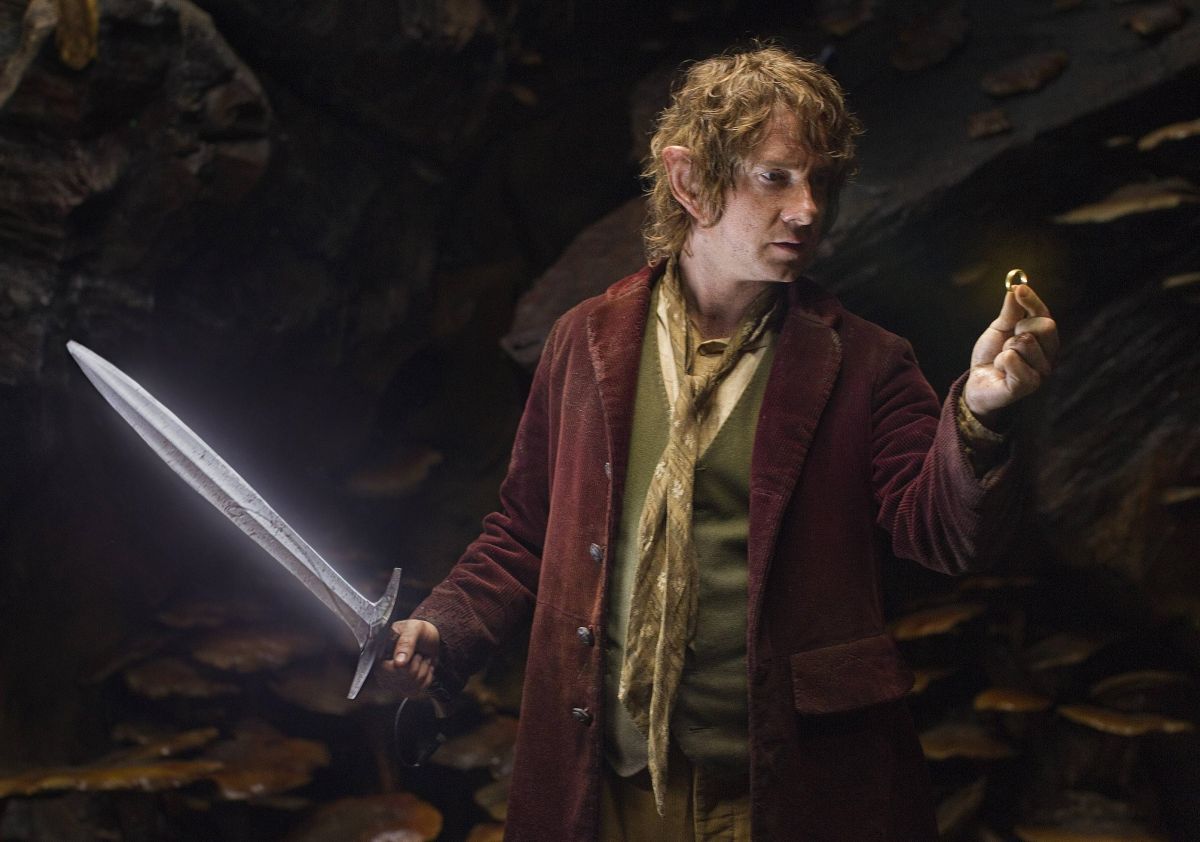
Would it really hurt to throw a million or two in the direction or just lend your name to someone like Vincent Ward and Geoff Murphy to help them get the bigger breaks they deserve? It is not as though the ‘executive produced by Peter Jackson’ label would cause the film to fail to make any money back. Or for that matter why you seemed interested in taking up the cause of US criminal injustice cases in West of Memphis (2012). If you want to champion criminal injustice cases, there are surely plenty on New Zealand’s own doorstep – David Bain, Peter Ellis, Arthur Allan Thomas – that are worthy of documentary examination.
No, I guess what upsets me the most, Peter, is that you sold out your own country. I grudgingly went along with the idea of the massive tax breaks offered to New Line Cinema back in 2001 during the production of The Lord of the Rings – something that was quickly copied other countries and states around the world. However, what happened with The Hobbit defied all belief. It began in 2010 with rumours that the local Actors Union was threatening labour action over the difficulty of negotiating to obtain a collective agreement. What happened next inflamed mere rumour and speculation into a debate that tore up New Zealand.
Outsiders have to gain an appreciation of just how tied up in the New Zealand psyche The Lord of the Rings is. It was the tiny country’s one shining moment on the world stage that the nation was proud of, it created a huge tourist industry boom where suddenly the whole world wanted to see the country. As the country proudly proclaimed to the world in in advertising campaigns – New Zealand was Middle-Earth.
When these strike rumours started, you, Mr Jackson, went on television and suggested that Warner Brothers were considering moving the production to another unspecified country because of this. The idea of an actor’s union trying to halt the production of The Hobbit ended up in protests in the street and the vilifying of those bad union people as wanting to destroy something that was quintessentially New Zealand’s own. Warner Brothers executives flew down to an emergency meeting with Prime Minister John Key and in a rush sitting of Parliament, a bill was passed that forbade non-salaried persons from forming into any kind of collective bargaining agreement for the duration of the filming. Crisis averted – oh and for its price of agreeing to allow New Zealand to keep its claim to The Hobbit, New Zealand taxpayers had to agree to the deal sweetener of Warner Brothers getting reported tax rebates of 75% of the film’s budget.
Let us place some of this in perspective. Imagine if you will, a company like Walmart or fairly much any fast-food franchise that hates workers having any entitlement to rights going to President Obama and demanding that he pass a law that forbids their employees from forming any unions otherwise they will take their business elsewhere. Imagine equally, the country so afraid by such a threat that they kowtow and pass a law overnight. Now imagine a film studio doing the same – they would surely be laughed out of the White House in an instant. (Indeed, when Wisconsin governor Scott Walker tried to pass a far less severe law in 2011 that limited the bargaining rites of all state employees, protesters were so vehemently opposed that they surrounded the capital for two months and then pushed a recall election to remove Walker). Mr Jackson, you should be ashamed of turning an entire country into a third world sweatshop. You were the cheerleader for this and in doing so – in so blatantly manipulating the national psyche to serve your own ends – you lost all my respect.
Indeed, The Lord of the Rings no longer says anything about how tiny little New Zealand can succeed on the world stage; it instead says everything about how fragile the country’s self-identity is that its populace are so willing to be led like docile sheep and cheer on their own disempowerment over an issue of national pride. And that is not even getting into some of the other less than palatable incidents that have surrounded the shooting of The Hobbit – the bogus ‘100% Pure’ tourism promotional campaign and the government’s shaming of experts who spoke up about its less than perfect environmental image; animal abuse on the set; the firing of tourism guides who were members of the Actors Union. With perfect appropriateness, the Roger Awards, which are voted on by several local industry and media watchdogs, gave Warner Brothers their top award for The Worst Transnational Corporation Operating in New Zealand in 2010 and a special award to Peter Jackson as Quisling of the Year (a term named after Norwegian Prime Minister Vidkun Quisling who sold his own country out and actively collaborated with the Nazi takeover in 1940).
A decade ago, Mr Jackson, you were the genuine success story, the local boy from Down Under who had taken on the entire world and come out on top; a decade later you seem like no more than the heirs of Walmart or the CEOs some other mega-corporation whining about the necessity of tax breaks and gutting an entire nation as disposable labour for the interest of shareholders or so as to take the profits overseas.
Maybe the great hypocrisy that has overcome you, Peter, is that you can engage in such appalling anti-collective behaviour and then in complete straight-face serve up lines of dialogue in the film such as “It’s the everyday ordinary folk that keep the evil at bay,” whereas everything about the Hobbit labour saga has played out as exactly the opposite of that. Or the sheer hypocrisy of various parties doing everything they can to maximise how much money they can screw out of a small country – all to make a series of films where the overriding theme by the original author was one about the perils of greed.
Yours sincerely,
Richard Scheib
(A disappointed former fan)
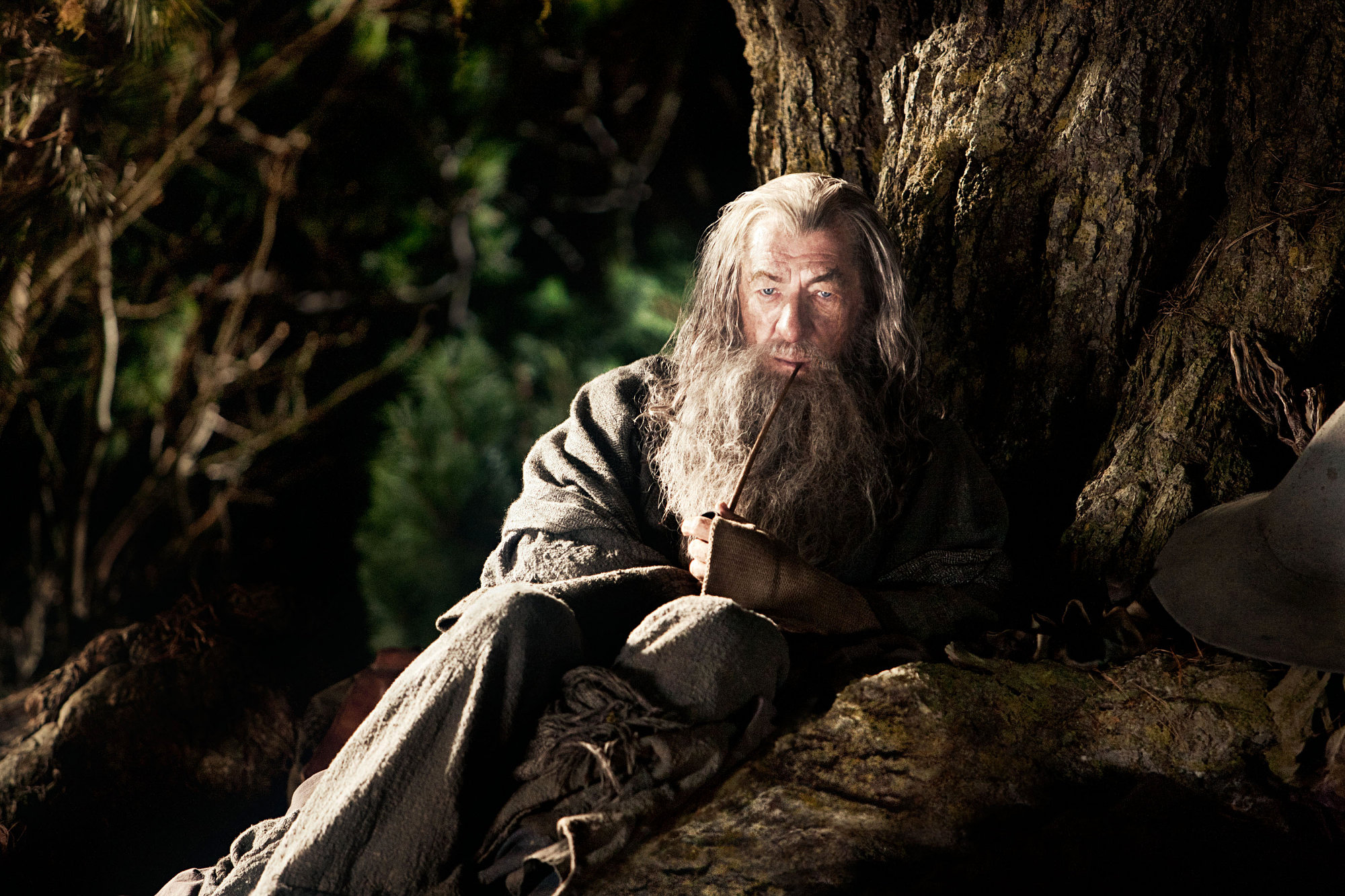
The chequered production history of The Hobbit is surely indicative of the monumental self-importance that has overtaken Peter Jackson in the last few years. Speculation that Jackson would take up The Hobbit next began almost immediately after the release of the trilogy. In reality, problems occurred in that while New Line Cinema held the rights to The Lord of the Rings, rights to The Hobbit was held by MGM and this resulted in much legal wangling before the two companies agreed to a co-production deal on the finished film. Jackson seemed to shoot himself in the foot by doing the almost unheard of move for a Hollywood filmmaker in filing a lawsuit against New Line Cinema in 2005, accusing them of creative accountancy and cheating him of several millions worth of profit sharing from the films. (The Tolkien estate launched a similar lawsuit around the same time, as also did fifteen of the actors involved in the original trilogy). New Line responded by firing Jackson from The Hobbit and announcing that the film would go ahead with Sam Raimi as director. This brought cries of dismay from the Lord of the Rings fanbase.
The parties sorted their differences in 2007 and it was agreed that the production would go ahead with Jackson taking an executive producer role and with Guillermo Del Toro, the director of Blade II (2002), Hellboy (2004) and Pan’s Labyrinth (2006), in the frontseat. Del Toro flew down to New Zealand in 2008 to work on the script, where it was planned that The Hobbit would be two films, but in 2010 Del Toro then made an abrupt announcement that he was going to depart. This would appear to be an amicable parting with Del Toro citing frustrations over the holds-ups on the project due to the legal wangling over the rights (he retains a co-screenwriting credit on the finished film), New Line’s insolvency and subsequent absorbtion by Warner Brothers in 2008 and MGM’s teetering on bankruptcy in 2009-10. After Del Toro’s departure, Jackson stepped into the director’s chair and shortly after shooting began announced that the previous duo of films would now become a trilogy with An Unexpected Journey being followed by The Hobbit: The Desolation of Smaug (2013) and The Hobbit: The Battle of the Five Armies (2014).
Finally seen, The Hobbit: An Unexpected Journey comes as equal amounts a return to what Peter Jackson does well and a disappointment. The Hobbit (1937) was originally published by J.R.R. Tolkien as a children’s tale. It hails in at a modest 350 pages or 95,000 words. Tolkien was asked by publisher Allen & Unwin to come up with more hobbit tales and went away and returned seventeen years later with the magnum opus that was The Lord of the Rings (published in three volumes between 1954 and 1956). Where The Hobbit hailed in at 350 pages, The Lord of the Rings comes in at a massive 1500 pages or just short of half-a-million words.
This is worth noting, given that when it comes to the film adaptation The Hobbit is now being expanded out to fill the equivalent length of The Lord of the Rings film trilogy. In other words, an average size novel has been expanded out to the equivalent of a work that was originally 4.35 times its size. The extra story that fills An Unexpected Journey has been taken from The Quest of Erebor, an abandoned fragment written by Tolkien designed to knit together The Hobbit and The Lord of the Rings that was posthumously published by Tolkien’s son in Unfinished Tales (1980). There is also the addition of the character of Radagast, who was a mere name in The Hobbit and whose story was expanded in Unfinished Tales. It is customary to pour ridicule on the previous Rankin-Bass animated film The Hobbit (1977), which I am prepared to argue is better than most give it, but for all that it is a more authentic version of the book than the over-extruded work we have here.
Peter Jackson is saddled with both the boon and the curse of a worldwide cult following that most successful artists and bands have encountered at some point – where everybody wants you to do more of the same thing they loved the first time and not everybody is willing to follow you when you want to do the natural thing that artists do and experiment with different things. You could point to examples like Gene Roddenberry who created the cult hit of Star Trek (1966-9) and never had another success again until he revisited the familiar with Star Trek: The Next Generation (1987-94). Most infamously, there was George Lucas who had the enormous hits of Star Wars (1977), Raiders of the Lost Ark (1981) and various sequels to these. When he tried to do something else, this was followed by a string of critical and/or box-office flops with Howard the Duck (1986), Labyrinth (1986) and Willow (1988), which resulted in him spending the next decade licking his wounded tail before returning to make a gazillion dollars by merchandising all he could out of Star Wars and returning to make a series of insipid prequels.
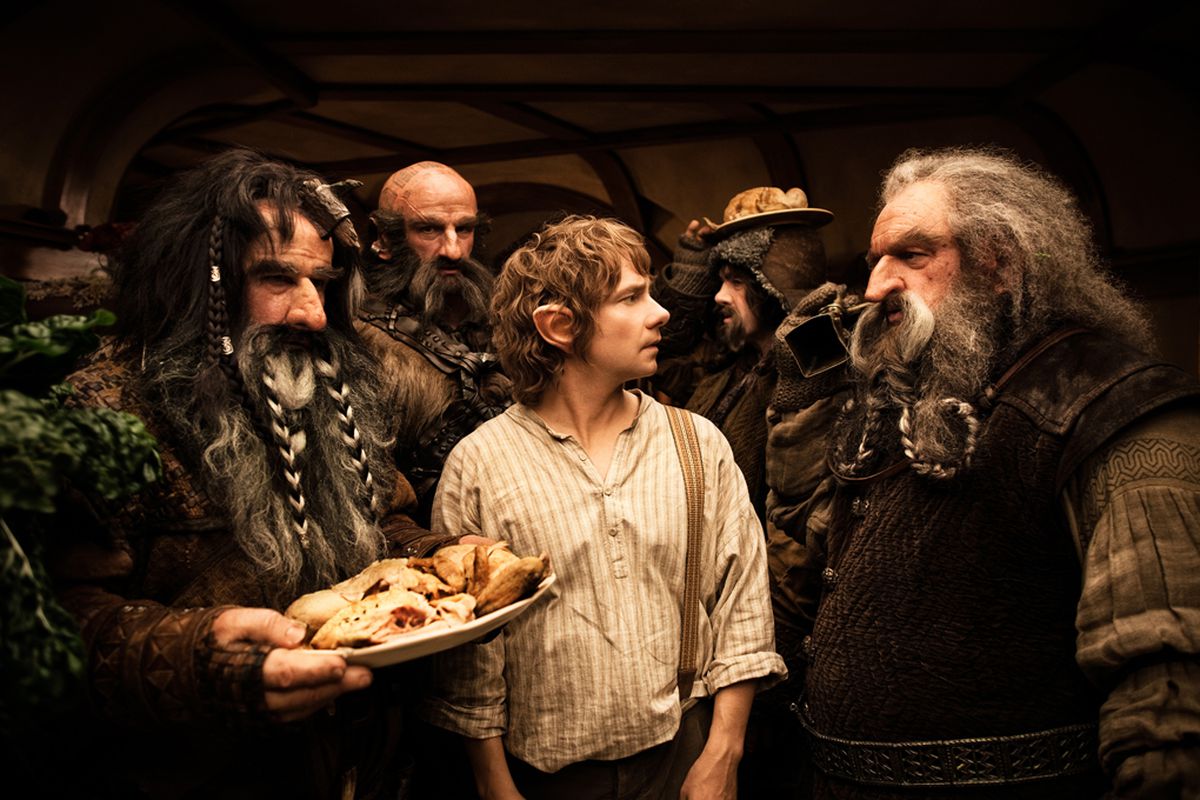
After the box-office indifference of both King Kong and The Lovely Bones, The Hobbit: An Unexpected Journey is Peter Jackson likewise going back to familiar territory. The question is whether a return visit to Middle-Earth is going to go the way of Star Trek: The Next Generation, which quickly found its way out of slavishness to the original to win a new generation of fans, or the disappointment of the Star Wars prequels.
Alas, the more you settle into The Hobbit: An Unexpected Journey, the more it feels like it is taking the path of the Star Wars prequels. The only characters familiar to both The Hobbit and The Lord of the Rings books are Elrond, Gollum and Gandalf. By contrast in the film, much of the plot has been substantially rewritten in order to fit in cameos from familiar characters/actors – wraparound narration from Ian Holm as the older Bilbo, appearances from Elijah Wood’s Frodo, Cate Blanchett as Galadriel and Christopher Lee as Saruman, while Orlando Bloom’s Legolas is set to appear in the next film. In other words, what we have feels like fanservice. As the meeting of parties occurs in Rivendell, you feel that the plot is stretching to make nudges and winks to those in the know as it stitches up the backstory connecting the two sagas. One cute bit is a reappearance from Bret McKenzie with some speaking lines this time – McKenzie became the centre of a cult following due to his single scene as an extra in The Fellowship of the Ring – see the documentary Frodo is Great … Who is That? (2004) – before going onto international fame in The Flight of the Conchords (2007-9).
The problem for Peter Jackson is that the source material he is working with in The Hobbit is much more lightweight than what he had with The Lord of the Rings. Both of the original Tolkien works tell essentially similar stories – a tiny hobbit leaves the idyllic Shire and joins a company of divers peoples on a journey out into the big wide world. For J.R.R. Tolkien, The Hobbit was essentially a children’s tale – a bildungsroman about a little man venturing out into the world, finding a magic ring and defeating a dragon with his wits and courage. The Lord of the Rings follows a similar path but expands that into a bigger adventure and far more complexly detailed world.
What had happened in between the writing of The Hobbit and The Lord of the Rings was World War II and thus much of The Lord of the Rings is overshadowed by a sense of a just war of a tiny few against a vast and overwhelming evil, a sense of the ruin and devastation caused by the conflict and of continent-sized forces being moved by destiny.
That was something that Peter Jackson tapped into superbly when he made The Lord of the Rings. Alas, when it comes to The Hobbit, this type of epic conflict is not present in the source material – the story is just an adventure picaresque. Thus to try and find the original trilogy’s epic drive, Jackson and his co-writers are forced to alter the story considerably and add much. In comes a new villain called The Necromancer on the horizon and much muttering between Gandalf and the elves about a great evil lurking and dark forces at work. One thing that one suspects is going to be a disappointment to many of the fans that flocked to The Lord of the Rings is the lack of any romantic element here – even if that was something that was added for those films and having an all-male party here is being far more faithful to J.R.R. Tolkien (there is an almost complete absence of any female characters in The Hobbit book).
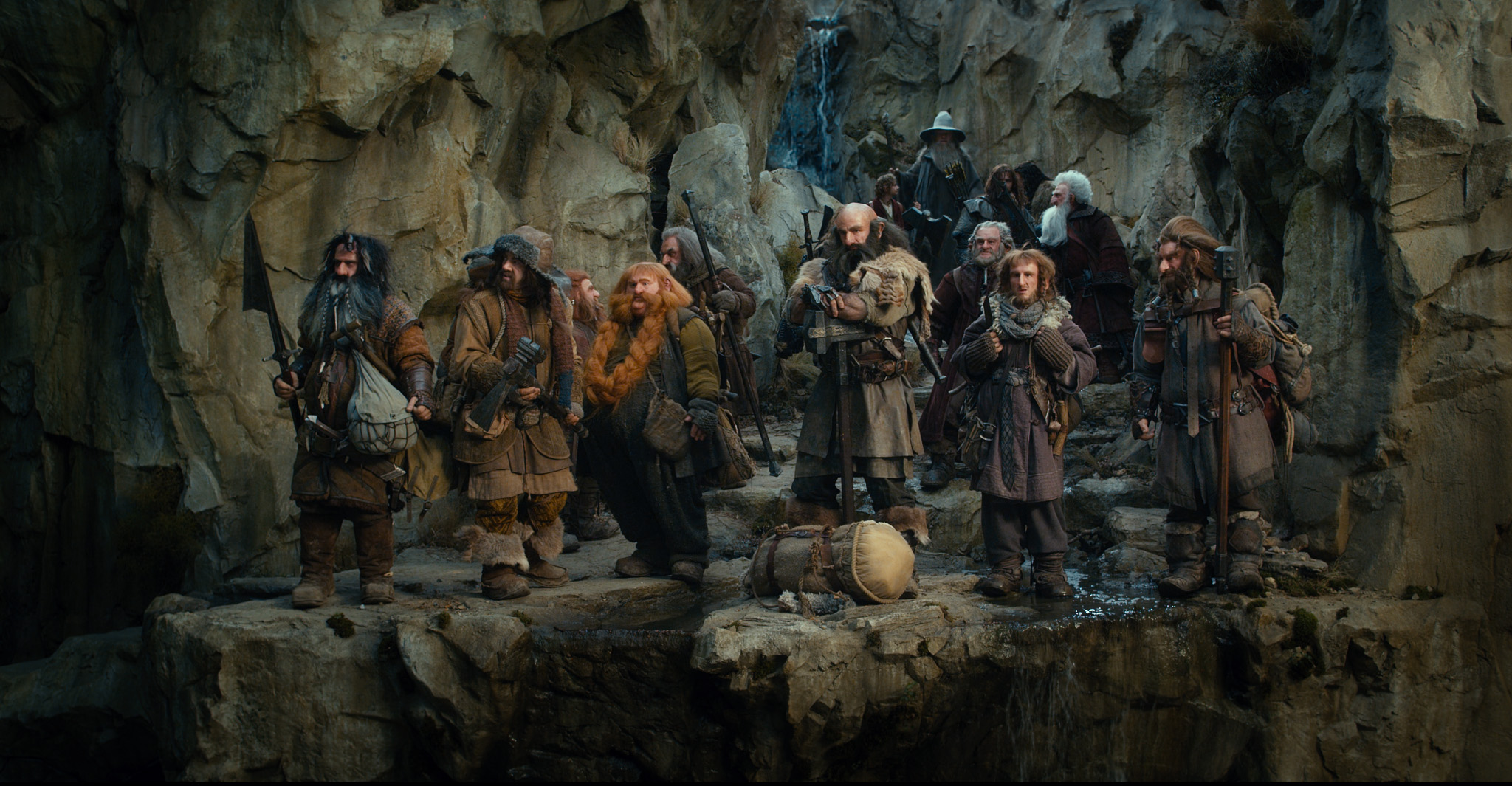
The good thing to be said about The Hobbit: An Unexpected Journey is that it gets Peter Jackson back doing what he does best, where The Lovely Bones had him waaay out of his territory. The film soars through epically beautiful shots diving down into the depths of the mines of Erebor and the goblin stronghold in the Misty Mountains, showing the luxuriant rolling dales of The Shire and so on. Admittedly, some of the shots are starting to seem a little cliche by now – more sweeping helicopter shots through the New Zealand countryside showing the party framed against mountaintops, while the scenes of the Wargs racing across the countryside feels not too different from similar scenes in The Two Towers. Jackson stages the epic battle and action scenes he does so well – especially the climactic scenes with the party cornered by the Wargs in the trees on a cliffside and their salvation by the eagles. There is another huge scaled battle down in the goblin mines but this is somewhat offset by playing a good deal of the action as comedy. Nuance of characterisation has never been Peter Jackson’s strong suit but the bonhomie and liveliness among the dwarves during the opening scenes is something that suits his strengths well.
On the other hand, the film does feel extruded. Every tiny beat and incident of the book has been padded out – the opening arrival of the dwarves and their party takes up nearly 45 minutes. We do after all have a film where only the first six chapters of The Hobbit has been extended to make a film that lasts nearly two-and-three-quarter hours (169 minutes). You do ever so slightly get the impression that Jackson’s drive towards self-importance has pushed the film into something bloated, whereas if this were a work being made by a studio hack, the film would (and easily could) have been trimmed by at least an hour of running time.
As before, Jackson pushes for big name casting – even in the small roles. Try as one might, I can’t quite close my eyes and imagine Martin Freeman as being a younger version of Ian Holm. Freeman plays the early scenes with a grumpy attitude and the rest of the film with a series of awkward facial double-takes. He is likeable enough and certainly a far more down-to-earth hobbit than the impossibly prettified Elijah Wood. Ian McKellen is back with customary dignity as Gandalf (and incidentally gets to do more magic as a wizard here than in all the other films put together).
When it comes to the dwarves they, as they are in the book, are a mass it is often hard to tell one from the other. Here Jackson falls into the tendency of too many adaptations of Snow White where the dwarves (most of whom are played with Scottish/Irish accents if not actors) become constant comic figures. Among these, Richard Armitage stands out as the leader of the group, although he is marred by the film’s constant attempt to write Thorin as this saga’s equivalent of Aragorn. The scene-stealer proves to be James Nesbitt who gets some of the film’s funniest lines. In the role of the wizard Radagast. there is an appealingly eccentric performance from Sylvester McCoy, alias the seventh incarnation of Doctor Who (1963-89, 2005– ) who has almost entirely vanished from cinema screens since his last appearance as The Doctor more than two decades ago.
The Hobbit: An Unexpected Journey was parodied in The Starving Games (2013). Subsequent to this, Middle-Earth was revisited in the Jackson-less tv series The Lord of the Rings: The Rings of Power (2022- ). Also of interest is the earlier animated adaptations The Hobbit (1977), The Lord of the Rings (1978) and The Return of the King (1980). Tolkien (2019) is a biopic of J.R.R. Tolkien.
(A big thanks to Frank Macskasy at Frankly Speaking who provided many of the background resources for this article – see his fine piece on the political furore Peter Jackson’s Precious).
(Nominee for Best Special Effects and Best Makeup Effects at this site’s Best of 2012 Awards).
Trailer here

